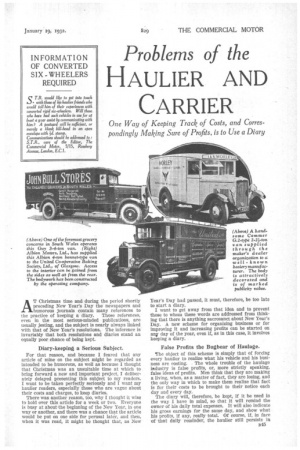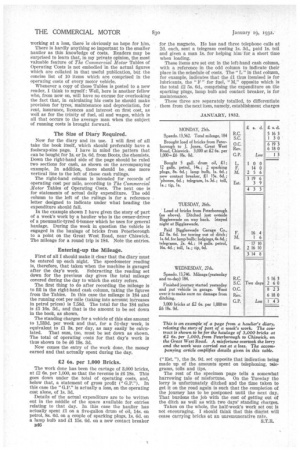Problems of the
Page 63

Page 64

If you've noticed an error in this article please click here to report it so we can fix it.
HAULIER AND CARRIER
One Way of Keeping Track of Costs, and Correspondingly Making Sure of Profits, is to Use a Diary
AT Christmas time and during the period shortly preceding New Year's Day the newspapers and humorous journals contain many references to
the practice of keeping a diary. Those references, even in the most serious-minded publications, are usually jesting, and the subject is nearly always linked with that of New Year's resolutions. The inference is invariably that both resolutions and diaries stand an equally poor.chance of being kept.
Diary-keeping a Serious Subject.
For that reason, and because I feared that any article of mine on the subject might be regarded as intended to be humorous, as well as because I thought that Christmas was an unsuitable time at which to bring forward a new and important project, I deliberately delayed presenting this subject to my readers. I want to be taken perfectly seriously and I want my haulier readers, especially those who are vague about their costs and charges, to keep diaries.
There was another reason, too, why I thought it wise to hold over this article for a week or two. Everyone is busy at about-the beginning of the New Year, in one way or another, and there was a chance that the article would be put on one side for perusal later, and then, when it was read, it might be thought that, as New Year's Day had passed, it must, therefore, be too late to start a diary.
I want to get away from that idea and to prevent those to whom these words are addressed from thinking that there is anything sacrosanct about New Year's Day. A new scheme for organizing business or for improving it and increasing profits can be started on any day of the year, even if, as in this case, it involves keeping a diary.
False Profits the Bugbear of Haulage.
'The object of this scheme is simply that of forcing every haulier to realize what his vehicle and his business are costing. . The whole trouble of the haulage industry is false profits, or, more strictly speaking, false ideas of profits. Men think that they are making a living, when, as a matter of fact, they are losing, and the only way in which to make them realize that fact is for their costs to be brought to their notice each day and every day.
The diary will, therefore, be kept, if it be used in the way I have in mind, so that it will remind the owner of his daily total expenses. It will also indicate his gross earnings for the same day, and show what his profits, if any, really total. Of course, if, in face of that daily reminder, the haulier still persists in
Working at a loss, there is obviously no hope for him.
There is hardly anything so important to the smaller haulier as this knowledge of costs. Readers may be surprised to learn that, in my private opinion, the most valuable feature of The Commercial Motor Tables of Operating Costs is not embodied in the actual figures which are collated in that useful publication, but the concise list of 10 items which are comprised in the operating costs of every motor vehicle.
Whenever a copy of those Tables is posted to a new reader, I think to myself : Well, here is another fellow who, from now on, will have no excuse for overlooking the fact that, in calculating his costs he should make provision for tyres, maintenance and depreciation, for rent, insurance, licences and interest on first cost, as well as for the trinity of fuel, oil and wages, which is all that occurs to the average man when the subject of running costs is brought forward.
The Size of Diary Required.
Now for the diary and its use. I will first of all take the book itself, which should preferably have a foolscap-size page. I have in mind the pattern that can be bought for 1s. or is. 6d. from Boots, the chemists. Down the right-hand side of the page should be ruled two sections for cash, as shown on the accompanying example. in addition, there should be one more vertical line to the left of these cash rulings.
The right-hand column is intended for records of operating cost per mile, according to The Commercial Motor Tables of Operating Costs. The next one is for statements of actual daily expenditure. The odd column to the left of the rulings is for a reference letter designed to indicate under what heading the expenditure should fall.
In the example shown I have given the story of part of a week's work by a haulier who is the owner-driver of a pneumatic-tyred 6-tonner which he uses for general haulage. During the week in question the vehicle is engaged in the haulage of bricks from Peterborough to a point on the Great West Road, near Chiswick. The mileage for a round trip is 184. Note the entries.
Entering-up the Mileage.
First of all I should make it clear that the diary must be entered up each night. The speedometer reading is, therefore, that taken when the machine is garaged after the day's work. Subtracting the reading set down for the previous day gives the total mileage covered during the day to which the entry refers.
The. first thing to do after recording the mileage is to fill in the right-hand cash column, taking the figures from the Tables. In this ease the mileage is 184 and the running cost per mile (taking into account increases in petrol prices) is 7.58d. The total for the 184 miles is £5 16s. 3d., and that is the amount to be set down in the book, as shown.
The standing charges for a vehicle of this size amount to 1,533d. per week and that, for a 51-day week, is equivalent to £1 3s. per day, as may easily be calculated. That sum, too, must be set down as shown. The total of operating costs for that day's work is thus shown to be £6 19s. 3d.
Now comes the entry of the work done, the money earned and that actually spent during the day.
£2 6s. per 1,000 Bricks.
The work done has been the cartage of 3,000 bricks, at £2 6s. per 1,000, so that the revenue is £6 18s. This goes down under the total of operating costs, and, below that, a statement of gross profit (" G.P."). In this case the "G.P." is actually a loss, on the operating cost alone, of Is. 3d.
Details of the actual expenditure are to be written out in the middle of the space available for entries relating to that day. In this case the haulier has actually spent on a five-gallon drum of oil, 14s. on petrol, 8s. 6d. on a couple of sparking plugs, is. 6d. on a lamp bulb and 15s. 6d. on a new contact breaker B46 for the magneto. Ile has nad three telephone calls at 2c1. each, sent a telegram costing is. 3d., paid is. toll and given a man 1s. for helping him for a short time when loading.
These items are set out in the left-hand cash column, with a reference in the odd column to indicate their place in the schedule of costs. The " L " in that column, for example, indicates that the £1 thus itemised is for lubricants, the " F " for fuel, "M," opposite which is the total 1.2 5s. 6d., comprising the expenditure on tile sparking plugs, lamp bulb and contact breaker, is for maintenance.
These three are separately totalled, to differentiate them from the next item, namely, establishment charges
This is an example of a page from a hatdier's diary, relating the story of part of a week's work. The contract is shown to be for the haulage of 3,000 bricks at £2 6s. per 1,000, from Peterborough to Chiswick, on the Great West Road. A misfortune overtook the lorry and the work was carried out at a loss. The accom. panying article amplifies details given in this table.
("Est. "), the 3s. 9d. set opposite that indication being made up of the amounts spent on telephoning, telegrams, tolls and tips.
The rest of the specimen page tells a somewhat harrowing tale of misfortune. On the Tuesday the lorry is unfortunately ditched and the time taken to get it on the road again is such that the completion of the journey has to be postponed until the next day. That burdens the job with the cost of getting out of the ditch as well as with two days' standing charges.
Taken on the whole, the half-week's work set out is not encouraging. I should think that this diarist will cease carrying bricks at an unremunerative rate.




































































































